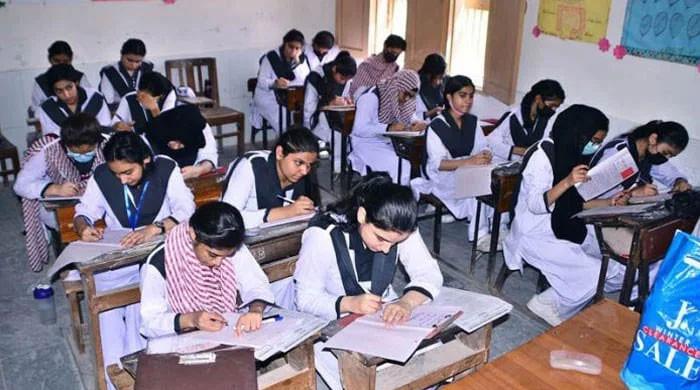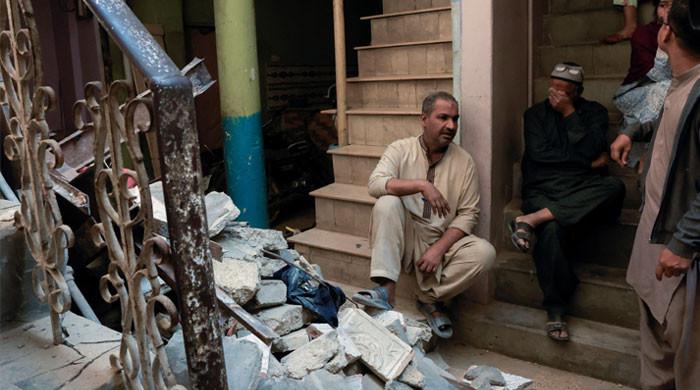Sindh govt body urges LEAs to sensitise staff handling cases of violence against women
Commission asks law enforcement agencies to ensure that an FIR is registered in such cases without any delay or excuses
September 11, 2020

KARACHI: The Sindh Commission on the Status of Women (SCSW) on Friday said it was “deeply concerned” about the surge in violence against women and urged law enforcement agencies to take strict action and sensitise their staff and officers to ensure that an FIR is registered in such cases without any delay or excuses.
The SCSW, in a statement, suggested that competent and appropriate human and financial resources should be allocated to the government departments, along with strong redressal mechanisms, so that government institutions can be strengthened.
“Funds should also be allocated for raising awareness,” it said, adding that strong linkages should be developed between the government and civil society organisations to provide relief to the women of Sindh.
Read more: Know your rights: What to do if you have been sexually harassed?
The statement comes after a mother of three was allegedly robbed and raped in front of her children after getting stranded on the Lahore-Sialkot motorway late Wednesday when her car ran out of fuel.
The police response was delayed over jurisdiction issues which allowed the criminals to commit the alleged crime and flee.
The commission said that it had observed a delay in the registration of a police report in cases of violence against women.
Shedding light on the reasons, the statement said that in some instances, the police were unwilling to register a first information report (FIR) against the husband, father, brother, or relative of the complainant.
"In such cases it was noted that the police advised the women complainants to solve the matter at home," the body observed.
The commission stated that the LEAs also include “wrong clauses”, which leads to a delay in the registration of the FIR.
Giving an example of the LEAs neglect, the body said: “In one recent case of acid crime, the police had registered the case on the wrong clause and delayed the registration of the FIR, which led to the accused being released on bail. The challan was also not submitted in the respective court on time.”
“Additionally, in several cases of violence against women, families back out of the cases as their lawyers emphasise more on out of court settlements. It has been observed that judges often used their discretionary power to grant bail on interim FIR,” said the statement.
Proposing solutions to end the menace, the body said that it has developed a police training manual and requests the police officials to "urgently utilise it in the training of police station staff".
"There is a need for judges and lawyers to be gender sensitised and familiarised with women friendly laws," it added.
The SCSW requested the provincial ombudsperson to take action and slap a fine all those universities and organisations that have not displayed the code of conduct and have failed to form harassment committees so far.
The statement also noted that the Protection Against Harassment at the Workplace Act 2010, has not been implemented in “its full capacity” in the universities and organisations of Sindh.
To validate its claim of the harassment laws not being implemented, the statement said: “During the monitoring visit of Karachi University, SCSW found that the university administration did not have any knowledge about the Protection Against Harassment at the Workplace Act, 2010 did not have their code of conduct displayed in the university and did not have a harassment committee.”
The SCWS has amended several laws including the Sindh Protection Against Harassment of Women at the Workplace Act, 2018, the Sindh Acid Control and Acid Crime Prevention Bill, 2016, the Sindh Dowry and Bridal Gifts restriction Act, 2017, The Sindh Domestic Violence (prevention and protection) Act, 2013, The Divorce Act No. IV of 1869, The Christian Marriage Act, 1872, and developed their respective rules of business and sent them to the concerned authorities.
Read more: Cyclist Samar Khan says faced harassment in Islamabad
“SCSW urges the concerned government departments that the amended laws be included in the agenda of the cabinet and be presented in the cabinet for approval,” it said.
A significant factor contributing to the suffering of women is that majority of the women helplines are not in full operation.
“In Sindh, there are more than 10 government women helplines and additional private helplines. Government complaint cells, helplines, child protection cell, and shelter home helplines should be upgraded,” it said.
The SCSW demanded that the SOPS that it has created for safe homes should also be adopted “without delay”.











